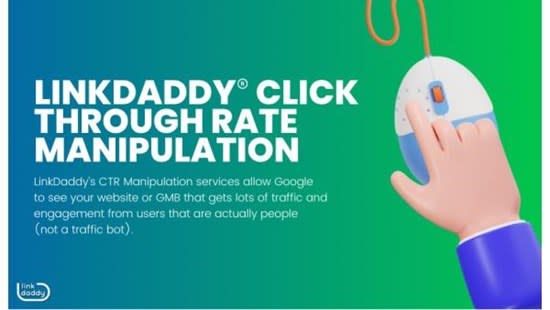Exploring the Relationship Between CTR Control Solutions and Individual Actions
In the world of digital advertising and marketing, the impact of click-through price (CTR) manipulation services on individual behavior stays a complex and interesting subject. As online platforms significantly count on CTR metrics to gauge the success of web content, items, and solutions, understanding how these manipulated prices influence individual engagement and decision-making processes is vital. The interplay in between CTR control and user behavior increases concerns regarding credibility, dependability, and the moral effects of such methods. By dissecting the intricate partnership in between CTR manipulation solutions and customer behavior, fascinating insights arise that might improve our understanding of electronic advertising and marketing techniques and their impacts on customers.
Impact of CTR Manipulation on Habits
Examining the impact of Click-Through Price (CTR) control on customer behavior discloses vital insights right into the dynamics of online interaction. CTR adjustment involves artificially pumping up the variety of clicks on a specific link or promotion to trick users and search engines. This technique can bring about a distorted understanding of a web page's appeal or importance, ultimately influencing customer behavior.

In addition, CTR control can alter the data made use of by algorithms to individualize user experiences. This can lead to individuals being served material that does not straighten with their preferences or rate of interests, inevitably bring about a decline in user contentment and involvement. Understanding the influence of CTR manipulation on user behavior is necessary for keeping openness and depend on in on-line interactions.
Individual Involvement With Adjusted CTR
User interaction with controlled CTR data often leads to manipulated perceptions of on-line content popularity and importance. When users interact with content based on unnaturally inflated Click-Through Fees (CTR), they may think that certain details, items, or services are a lot more preferred or credible than they really are. This can cause users choosing based on deceptive information, causing potentially undesirable end results.
Interaction metrics like sort, shares, comments, and time spent on a webpage are usually influenced by CTR manipulation. Users might be more likely to involve with web content that shows up to have higher interaction rates, better bolstering the cycle of manipulated perceptions. Because of this, web content creators and marketers might focus on generating material that produces high CTR instead than concentrating on producing really beneficial and pertinent product.

Psychological Results of CTR Manipulation

Furthermore, the mental impacts of CTR adjustment can additionally show up in modified decision-making processes. Individuals may be extra likely to click content solely based upon its perceived popularity, as opposed to its real worth or significance to their needs. This behavior change can result in a shallow involvement with on the internet content, where users might neglect premium but much less prominent offerings for those with synthetically improved CTRs.
Fundamentally, the emotional implications of CTR adjustment highlight the relevance you can look here of keeping transparency and authenticity in on the internet communications to cultivate real customer engagement and trust.
Ethical Considerations in CTR Adjustment
Taking into consideration the moral effects of adjusting click-through prices (CTR) in on the internet systems is important for maintaining stability and count on within the digital community. CTR manipulation increases problems about tricking customers, distorting data analytics, and endangering the credibility of on-line material. One significant moral factor to consider is the possible influence on individual freedom and decision-making. By synthetically inflating CTR, users may be misdirected right into clicking links or ads they would not have selected otherwise, resulting in an insincere online experience. Furthermore, CTR manipulation can skew the efficiency metrics that companies depend on to make critical choices, ultimately affecting market competition and customer trust fund.
An additional honest facet to ponder is the justness of adjusting CTR to obtain an unreasonable advantage over rivals. Participating in such methods not just breaches principles of fair game however likewise weakens the trust fund that users place in online platforms. It is important for organizations and electronic marketing experts to maintain ethical criteria in their techniques to make certain transparency, integrity, and long-term sustainability in the online environment.
Effects for Digital Advertising
CTR adjustment can lead to manipulated data analytics, misinforming marketing professionals into thinking that their projects are carrying out far better than they actually are. When users understand that CTRs have actually been adjusted, it can deteriorate count on in the brand name, leading to long-term negative effects for client loyalty and brand track record.
Additionally, the usage of CTR control services can develop an unreasonable competitive landscape, where companies that involve in such techniques obtain an artificial advantage over those that comply with moral marketing standards. This can stifle advancement and creative thinking in digital advertising and marketing, as success comes to be more about control methods than delivering genuine value to consumers. Inevitably, the ramifications of CTR manipulation for digital marketing prolong past short-term gains, influencing the general sustainability look at here now and reliability of advertising efforts in the digital world.
Conclusion
To conclude, the relationship in between CTR control solutions and customer behavior is intricate and complex. The impact of CTR manipulation on behavior, user interaction with controlled CTR, mental effects, moral factors to consider, and ramifications for electronic marketing all contribute in forming this connection. Understanding these dynamics is essential for marketers and scientists alike in order to browse the ethical ramifications and optimize the efficiency of their electronic marketing strategies.